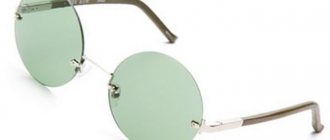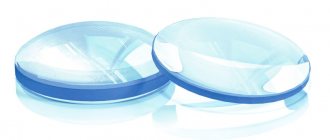People with poor eyesight need to understand how to clean their glasses to avoid streaks and stains.
Over time, dust, dirt and even grease stains settle on the glass. they cause the development of dangerous bacteria.
Therefore, to maintain the original appearance and functionality of the lenses, regular care is required. Using the wrong materials will result in scratches.
When and why should you wipe your glasses?
Even if you buy high-quality glass, it will quickly deteriorate without proper care. Inexpensive lenses will last a long time if quality materials and sprays are used. Glass or plastic is used to make glasses.
Glass lenses are considered to be of high quality and provide excellent vision. They last a long time, but use a soft and clean cloth to clean them. It is recommended to store glasses and the cleaning cloth itself in a separate case.
Frames are cleaned to maintain their attractive appearance, and lenses are cleaned to improve image clarity.
The problem is choosing a quality material, since clothes, new scarves and even paper napkins are too rough for lenses. To ensure proper care, the following recommendations are taken into account:
- glasses can be removed with only two hands, which allows you to keep the fastenings of the structure in optimal condition;
- Do not lift the product by the hair, as this leads to unscrewing the screws or the appearance of bent parts;
- It is forbidden to leave glasses in a place where they are exposed to sunlight, as this leads to a deterioration in their performance parameters;
- Do not use hot steam during cleaning;
- if the weather is bad outside, it is advisable to use special compounds that ensure the safety of the lenses;
- If scratches appear, you have to pay a lot of attention to cleaning them.
Storing glasses in a case is considered an ideal solution, since even when traveling you don’t have to worry about the product breaking in your bag or car.
If you do not properly care for the structure, this leads to the appearance of greasy stains, blurred vision, scratches or operational wear. Some people with poor eyesight are careless about their glasses, wiping stains with clothing or rough toilet paper. They are forced to turn to opticians for new products almost every 3 months.
Cleaning frequency
It is performed when any contamination is detected, but it is advisable to clean the lenses at least once a day. Even if in appearance they are clean and transparent, dust and bacteria settle on them within a few hours.
Attention! If you wear dirty glasses, then if your eyes become irritated or your eyelids are damaged, harmful microbes become the cause of inflammation or even eye diseases.
Key rules of care
- 5.1 Video - How to properly care for glasses
The main rule is extremely simple - you need to handle glasses with care (although contact lenses require even more careful care). Let's take a look at some important points.
Glasses as a means of curing diseases
How to wear it correctly?
Let's make a reservation right away that glasses are not a rim, and therefore they should not be worn on the head or often raised on the forehead. Otherwise, the temples will quickly bend, and the screws holding them will become loose, which will disrupt the symmetry of the lens arrangement. The result is eye fatigue. In addition, the vision correction device can easily be broken or damaged.
Rules for wearing vision glasses
You should put on/take off glasses very carefully, and always with both hands. Otherwise, the problems will be the same as those described earlier.
Important information! If necessary, you need to adjust your glasses by holding one of the lenses (top and bottom) with two fingers, but not by the bridge. In the second option, the load on the central element of the frame increases. And if it (the frame) is also painted, the paint may eventually wear off, causing an unattractive stain to appear in the most noticeable place.
Glasses must be held correctly
How to store?
It is important that the lenses do not come into contact with hard surfaces - this will prevent chips/scratches that impair the clarity of visible objects. If you need to temporarily remove your glasses and put them somewhere, do it with the lenses facing up. Place them in the case in the same way. Speaking of the case. It should be firm and have a lid. Try not to use a case, because if you constantly insert your glasses into it from one side, you will end up with a lot of small scratches on the glass.
Glasses storage case
You should not store glasses in the bathroom or kitchen - in these rooms they can get exposed to various types of aggressive substances, hot steam, grease, dirt and just water.
On a note! Deodorants, hairsprays, and perfumes are especially dangerous for glass. Therefore, glasses should always be removed before “beautifying”.
How to choose a case for glasses?
Another, no less important problem is exposure to heating devices and sunlight, which is especially important if glasses have plastic lenses. After all, at high temperatures, plastic can melt, causing alignment to be disrupted.
How to clean?
Frames need to be cleaned to maintain their aesthetics, and lenses need to be cleaned to maintain clarity. The most important thing in this case is the choice of suitable material, especially when it comes to cleaning the lens on both sides. Rags, clothes or paper napkins are not suitable for this because they are too rough. Much depends, of course, on the specific type of lens, but there is a general rule: use only clean material stored in the case.
Wipes for glasses
Table. Instructions for caring for glasses.
| Steps, photo | Description of actions |
| Step 1 | As noted earlier, glasses should be removed with two hands, not one, otherwise the device may become deformed. |
| Step 2 | Wearing glasses on your head is another quick route to deformation. Moreover, the risk of glasses breaking in this situation increases significantly. |
| Step 3 | You cannot adjust your glasses with one finger, so as not to create additional load on the central part of the structure. Also, such actions will lead to abrasion of the paint in this area, which will not add attractiveness to the glasses. |
| Step 4 | Clean the glass with a special microfiber cloth - these are sold in a pharmacy or optical store. You can first rinse the glass with clean water and then wipe it dry with a napkin. To identify uncleaned areas, you can breathe on the glass and then promptly wipe the desired areas (until the condensation evaporates). |
| Step 5 | Glass can be cleaned using special solutions (in the form of a spray). Apply the solution to the glass, then perform the manipulations indicated in the previous step. |
| Step 6 | You can also purchase a glasses repair kit. After all, the screws that secure the arms can become loose during wear, but if you have such a set, they can be tightened with a special screwdriver. As an option, you can bring the glasses to the workshop. |
| Step 7 | The frame should be adjusted every year or two. This can be done in the same place where you purchased your glasses (usually free of charge). |
| Step 8 | If you do not use your glasses for some time, keep them in a special case so that the glasses are not accidentally damaged. The case can be purchased with glasses or separately. |
Rules for caring for plastic lenses
Plastic products have a reasonable price and can also have different thicknesses and characteristics. The advantages of buying such glasses include:
- insignificant mass;
- Ease of use;
- ease of care;
- small thickness;
- the ability to choose the original model.
But the disadvantages of plastic products include vulnerability to scratches or small cracks. Additionally, stains constantly appear on the lenses, which are quite difficult to eliminate. Therefore, care must be careful and correct.
For plastic products, it is recommended to use a microfiber cloth or other soft cloth. You can wash them under water with the addition of shower gel or liquid soap. For plastic lenses, manufacturers produce special wipes designed for daily or more frequent wiping. They are sold in opticians or pharmacies and also have a reasonable price.
Behind the glass
Glass lenses are expensive and have a long service life. This is due to the resistance of the material to various physical influences. The disadvantages of the design include significant weight compared to plastic products, as well as significant glass thickness.
If a person’s eyesight is too poor, sometimes opticians cannot even pick up the glasses. A significant advantage of glass lenses is their ease of care.
To maintain the cleanliness of structures, it is enough to regularly wash them with special purchased products. Such compositions can be replaced with plain water mixed with dishwashing gel or liquid soap. Cleaning is done with a soft cotton cloth or microfiber. If you use rough or hard tools, this will cause scratches.
The process of cleaning glass lenses is divided into stages:
- prepare a small but deep container into which a little warm water is poured;
- add a few drops of gel intended for washing dishes, and it is also possible to replace it with another detergent that does not contain abrasives, alkalis or acids;
- glasses are lowered into a soapy solution;
- the glass is thoroughly washed inside and out using a soft cloth;
- the products are left for 10 minutes on a hard and dry surface to drain excess water;
- clean glass is wiped with a flannel cloth or microfiber cloth.
Attention! After cleaning, it is advisable to carefully inspect the glass next to the window, which should not have streaks, cracks or stains.
How to wear glasses correctly
When wearing an optical device, a number of rules should be followed:
- Raising glasses on your hair only when necessary; you should not do this all the time, as they can fall and break. The screws will gradually become loose, you will have to give the glasses to a specialist for proper fixation. The arms will become curved, which will prevent you from holding them firmly on your head.
- Be careful when installing and removing the optical device to avoid the risk of damaging the plastic frame or thin lens.
- If your glasses slip off, they should be adjusted according to the rules. In this case, take the frame of one lens with your thumb and forefinger and push it up. Do not touch the glass as it will become cloudy. You should not adjust your glasses at the bridge of your nose; this area can become deformed and break.
- If a woman wears glasses, it is recommended to first apply makeup, apply varnish, perfume and spray, and only then install the glasses. This is due to the fact that these substances negatively affect the quality of lenses.
These rules are easy to apply, so anyone can follow them every day.
How to wipe glasses to avoid streaks
Even when purchasing a product, it is recommended to ask your doctor or pharmacist which products are suitable for cleaning. These solutions are sold in opticians or regular pharmacies. They differ in volume, composition, price and operating principle.
Before purchasing, it is recommended to read user reviews to choose a good composition for glasses.
Special sprays
Such solutions are gentle on spectacle lenses and also have antistatic characteristics. They contain components that prevent glasses from fogging. When using these solutions, no streaks or stains remain. Popular means:
- Spray "Good Look". It is used not only for lenses with diopters, but also for sun protection products. It easily removes dirt and stains and also increases light transmission. Regular exposure reduces fogging. Can be used for glass or plastic glasses. The solution is convenient to use and the consumption is minimal. The spray is available in a small bottle that can easily fit in a bag or car. The price ranges from 180 to 250 rubles.
- Spray "HD". Produced by a well-known Dutch company, and also intended for glass. You can wipe not only the lenses, but also the frames. The spray is suitable for a camera, video camera or other similar equipment. The cost is within 400 rubles.
- Spray Clean solution. Produced by a large Italian organization. Easily copes with dirt and has antistatic characteristics. Suitable for all types of lenses. The price of the product is 200 rubles.
Before purchasing any special product, it is recommended to study user reviews available on the Internet.
Microfiber
Napkins and rags made of this material easily cope with stains. Therefore, every person who regularly uses glasses should have them.
It is convenient to use microfiber while traveling, at work or at home. You can purchase a small napkin that can easily fit in a case or bag.
Attention! Microfiber cloths become dirty and lose their effectiveness over time, so they need to be washed regularly.
Reusable and disposable wipes
They are sold in pharmacies or opticians, as well as in regular stores. Napkins differ in price, quantity in a pack, material of manufacture and parameters. Their varieties include:
- Reusable. Usually made of microfiber, which easily copes with stains and fingerprints. You don't have to use commercial cleaning solutions, which greatly simplifies the maintenance process.
- Disposable. They are reasonably priced and do not require washing. Products are impregnated by manufacturers with antibacterial compounds.
If a person uses glasses regularly, then reusable wipes are purchased to save money.
Soapy water
Regularly wash glasses with a solution of water and soap. Instead of soap, you are allowed to use dishwashing liquid, shampoo or shower gel. The cleaning process is divided into stages:
- The accessory is placed under running water to wash away all dirt and germs;
- all parts are wetted, represented not only by the lenses, but also by the frame, as well as the temples;
- Apply a little soap or other similar product to a microfiber cloth;
- the composition is distributed across all parts of the glasses;
- nose pads can be cleaned with a toothbrush equipped with soft bristles, but you must not touch the glass, and the brush can also be replaced with a cotton swab;
- After treatment, the product is thoroughly washed with water so that no foam or soap remains, otherwise streaks will appear after the accessory dries.
After washing, the glasses are initially shaken and then wiped dry with a napkin.
To prepare a soap solution, you can use regular soap, which is grated and dissolved in warm water.
What to do if your glasses have a lot of scratches
Some people think that if there are scratches on their glasses, this is a reason to replace them. But there are simple ways to remove defects:
- polishing with felt and toothpaste;
- a mixture of water and soda, which is rubbed in a circular motion using a cloth;
- GOI paste (consists of chromium oxide and other components), applied using felt or cloth;
- polishing with an abrasive containing hydrofluoric acid.
To avoid unnecessary damage to the optical medium, you should still contact an optical professional. They will use high quality polishing products that will not harm the glass. While polishing, a person may put undue pressure on the surface on his own, which will contribute to the formation of cracks. This will make the glasses impossible to wear and will require purchasing a new model.
What should you not clean your glasses with?
Many lenses are equipped with a special anti-reflective coating that protects against exposure to sunlight or radiation from a laptop screen. Therefore, it is prohibited to use products containing ammonia or caustic components.
Do not use bleach or a special liquid designed for cleaning glass surfaces to clean glasses.
If there is a polycarbonate coating, do not use alcohol, hot water or dishwashing liquid to clean it. Do not use abrasive products, vinegar, rough cloths or plain paper napkins. Exposure to these substances and materials results in scratches. Small cracks will form even when using dirty cotton fabric.
Microfiber
Microfiber cleaning cloths are durable. They do not leave greasy stains on the lenses, they are convenient to carry with you and wipe them at any time.
It absorbs moisture well and can be used as a care product in winter and summer.
It can be used to wipe any type of lenses with different coatings. Microfiber cloths are very durable and can withstand up to 500 washes, making them reusable.
Microfiber is a very economical product, unlike other products. Wash it in soapy water, the temperature of which should be no more than 60 degrees, and dry it in a room, not on a radiator.
How to protect against pollution
To extend the life of your glasses, it is important to regularly and properly care for your lenses. To protect products from contamination, the following recommendations are taken into account:
- Cleaning is carried out daily using a special solution or soapy water;
- Do not touch the temples or lenses with dirty or greasy hands;
- Only clean and soft fabrics are used for cleaning;
- Glasses are stored exclusively in a case that protects from dust, dirt and mechanical shock.
Attention! Even the case needs regular maintenance, so it should be wiped with a damp cloth and dust or debris should be removed in a timely manner.
Why is it important to take care of your glasses?
With daily care and proper use of glasses, the following beneficial effects occur:
- maintaining cleanliness;
- absence of stains on the glass that interfere with the normal perception of surrounding objects;
- preventing the risk of decreased visual acuity due to improper use of optical aids;
- preventing mechanical damage to frames and lenses when properly stored;
- preventing the spread of bacterial microflora.
Proper use, storage, and care of glasses will allow you to wear them for a long time until your visual acuity changes or the patient desires to change frames.
Plastic
Plastic lenses are replacing glass lenses. They do not break and the accessory seems very light.
Its only drawback is the rapid appearance of scratches. Minor abrasions and scratches significantly impair visibility; they cannot yet be polished. Therefore, despite the fact that glass is going out of fashion, many still prefer such lenses.
How to clean plastic glasses? You can use microfiber or damp cloths. Also, such glasses clean quickly if you breathe on them and then wipe them.
But such procedures cannot replace washing. Often you hear phrases like this from the owners of such accessories: “I wash them, and they become as good as new. They shine in the sun and are easier to see.” This is true. It is not enough to simply clean your glasses of dust; they need to be washed regularly.











